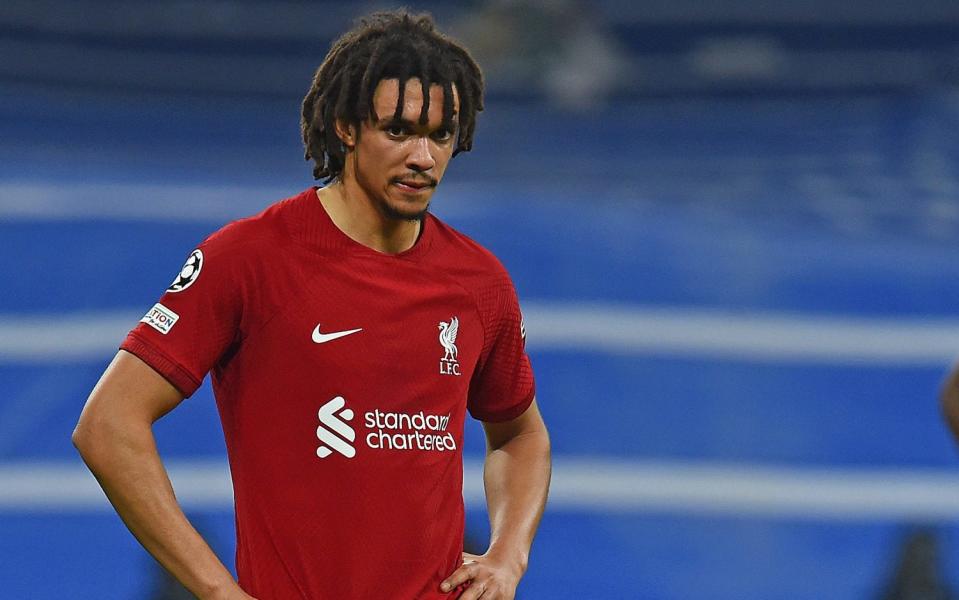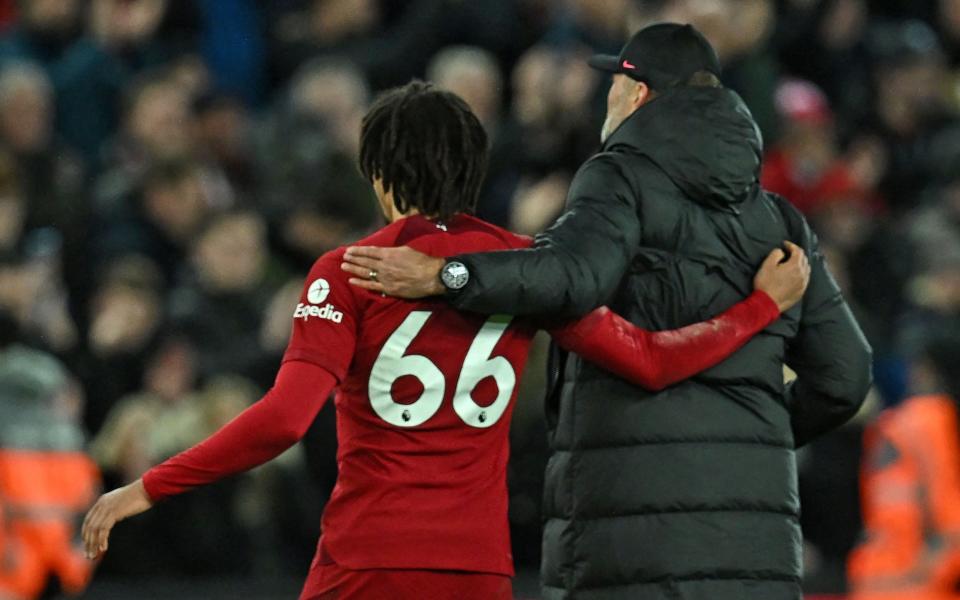Liverpool need to play to Trent Alexander-Arnold's world-class strengths – they should try him in midfield

Life is tough as a Liverpool defender in a world in which supporters and media obsess about the qualities you lack rather than those you possess. Trent Alexander-Arnold has joined my club in more ways than one.
In the early years of my Anfield career, I was a former youth-team midfielder constantly hearing and reading about what I needed to improve to become the complete full-back.
The debate was a reversal of what Alexander-Arnold is being subjected to at a difficult moment of his career, his omission from the England squad completing a tough season.
I established myself in the Liverpool team in an era when supporters wanted me to be more like Ashley Cole.
Alexander-Arnold must feel like he is being told to be more like an old-fashioned No 2.
I take no pleasure in extending the debate about his defensive instincts with my critique which followed Liverpool’s Champions League exit to Real Madrid.
My analysis is not designed to pick apart Alexander-Arnold. He has world class abilities. But I felt the time right to recognise that his skill set suits a particular style which Liverpool have not executed this season. That has made him more vulnerable.
For the last six years, Liverpool have been a front-footed team dominating the ball. That has allowed Alexander-Arnold and left back Andy Robertson to operate effectively as wing-backs in Jürgen Klopp’s favoured 4-3-3, the majority of opponents sitting back and trying to absorb pressure.

Alexander-Arnold thrives when Liverpool are at their best... but they are far from it
When Liverpool spend so much time attacking it is perfect for Alexander-Arnold to take possession and use his wand of a right foot to pick passes and deliver some of the best crosses in the Premier League since David Beckham was in his prime.
Watching Trent during Liverpool’s run to Premier League and Champions League glory, he looked exactly what he is. A creative midfielder who has found a place at right back under a manager who designs a team to spend more time in the attacking third than defending its own box. When the starting XI and system purrs, so does Alexander-Arnold.
The problem is Liverpool are not purring. Far from it.
They have not been the same since the opening Premier League game in 2022/23. Tactically, more teams are prepared to be adventurous and they are visibly and deliberately targeting Liverpool’s right. Because of Klopp’s personnel problems – his strikers pressing less and his midfielders lacking the energy or form to smother their opponent in their own half – the defence has come under more pressure than at any time since Alexander-Arnold's debut in 2016.
Most of the focus and criticism has been directed at Liverpool's midfield. But the number of defensive schoolboy errors which have cost goals and games has been a major feature of the team’s worst performances. The soft winning goal conceded to Real Madrid on Wednesday night was another example.
The nail in the coffin!
Karim Benzema bags his 89th goal in the #UCL to take the game away from a lacklustre Liverpool at the Bernabeu! 🙌 pic.twitter.com/yuMoKErOOL— Football on BT Sport (@btsportfootball) March 15, 2023
Top class defending demands concentration and intensity as much as winning individual challenges; knowing where and when attackers will make their runs, reading the game so you have that welcome habit of being in the right place to make an interception or clearance. As a defender, I always had the intensity. It compensated for what I lacked in quality.
Alexander-Arnold has quality but lacks the defensive intensity
Because he has been bred to be a creative midfielder, Alexander-Arnold has the quality but lacks the defensive intensity. In a defensive team, I relished games in which we had to resist pressure. There is no way I could have excelled as a full-back playing Klopp’s way. In an attacking team, Alexander-Arnold excels going forward. He is less effective when having to resist pressure. That frustrates me. I could never do what he does, but I am certain he can find the extra aggression needed to take his defending up a level.
If he doesn't, the longer Liverpool are part of the cluster of teams fighting for a top four place rather than in Premier League and Champions League title races, the more the defence will be tested and the more this season's problems will persist.
I truly believe Alexander-Arnold is at a crossroads and must think carefully this summer about how to evolve.
If Trent wants to think long-term – and win the trust of whoever is England’s coach and even a future Liverpool manager who might see the game much differently to Klopp – he has to step up to become the complete full-back.
When I was in the same situation I knew I had to do something about it.
There was a point in 2003 when it felt like there was such a fixation on what I was or wasn't offering in the final third, something had to give. My manager, Gerard Houllier, told me not to worry, ignore criticism and concentrate on my role preventing rather than creating goals. But it did bother me, especially when Liverpool signed attacking full-backs like Christian Ziege, John Arne Riise and Steve Finnan in successive summers to challenge my position.
During Houllier’s final season I suffered a broken leg and during my four month recovery I made a personal vow that I would make a concerted effort to be more attacking upon my return. The manager did not want or expect that from me. Tactically, it was not mine or the team's style. We won a cup treble because we played full-backs to drop back and defend, not attack. A different profile of full-back would have upset that system.
But two years on I was fed up with the sniping and felt I had to improve to help my career. Eventually Rafael Benitez joined in 2004 and turned me into a centre-back so that became the position I was most associated with.

Would turning him into a No 8 be so radical?
I have no idea if Alexander-Arnold has ambitions to go back to where he started and play in midfield, Gareth Southgate tried it and was criticised in some quarters, including by Klopp. To me the move was understandable to try to get the most out of Alexander-Arnold in an England team with a completely different profile and mindset.
In terms of his passing range, Alexander-Arnold is as good as anyone in Europe and the closest Liverpool have to Kevin De Bruyne or Steven Gerrard. Given how desperate Liverpool are for a creative midfielder, would turning him into a No 8 so he can fill those areas to whip those extraordinary passes into the penalty area be such a radical move? With Stefan Bajčetić out for the season, would Klopp even consider it as an immediate measure?
I am convinced Alexander-Arnold will return to midfield eventually, whether it is in his late twenties or early thirties. It does not matter how many medals a player has won, the best will always be looking at ways to get better.
Until then, he needs more competition for his place and guidance to eradicate mistakes to stop him being targeted and exposed.
What will not help is those with his best interests at heart burying their heads and pretending Alexander-Arnold does not need to improve at right back.

